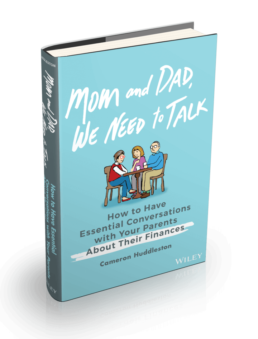One of the positive things that has come out of these difficult times is that the coronavirus pandemic has prompted many people to become better prepared for worst-case scenarios.
Applications for life insurance are up – way up, according to conversations I’ve had with experts in the life insurance industry. I’ve also been told that interest in online estate planning documents has been soaring. Nothing like the prospect of contracting a deadly virus to make you more aware of your mortality, right?
If you haven’t already put your final wishes in writing, don’t wait any longer to draft a will. Things happen. And if you die without a will, you’ll only make it more difficult for your loved ones who will be going through a tough time already.
What is a will?
A will is a legal document that lets you spell out who gets what when you die. It also allows you to name an executor – someone who will act on your behalf after you die. This person will be responsible for filing your last tax return, settling debts and distributing your assets. A will also allows you to name a guardian for your children.
However, a will does not help your heirs avoid probate, the legal process of distributing property. Insurance policies and some retirement accounts can bypass the probate process as long as beneficiaries are named – which is why it’s important to keep beneficiaries on those accounts updated. And accounts designated as payable on death can be transferred to beneficiaries without going through probate.
The length of probate varies by state, but, on average, it takes six to nine months, according to the American Bar Association. The cost of court fees and attorney fees associated with probate also varies by state. If you live in a state with a lengthy and expensive probate process, you might want to consider creating a living trust, which allows property placed in the trust to avoid probate.
Who needs a will?
Wills aren’t just for the rich and famous. Even if you don’t have a lot, you still probably want to have a say in what happens to your property. If you die without a will, your state’s laws will dictate who gets what. That means your house, your car or any money you have in the bank might go to someone you don’t want to have it.
Parents: If you have young children, you need a will to name a guardian to care for your children. You can’t simply make a spoken pact with your brother/sister/parent/friend/whomever because that won’t hold up in court. If you don’t have a will that names a guardian for your children, a judge will decide who will care for them – and it might not be the person you would’ve chosen.
A will also lets you name someone to manage any assets you leave behind for your children. I know from experience that many parents put off writing a will because they don’t know whom to name as guardian. It can be a tough choice to make. But wouldn’t you rather make that choice than let a judge who never met you and doesn’t know your values make that decision?
Couples: Don’t assume everything will go to your spouse or partner when you die. Intestacy laws – state laws that determine how property is divided when there is no will – typically divide property among the surviving spouse and blood relatives. If you want your spouse to get everything, you need to put that in writing in a will.
If you have a domestic partner, you certainly need a will to pass on property to that person. Otherwise, everything might go to blood relatives, and your partner might be left with nothing.
Singles: Even if don’t have a partner or children, you still need a will to let your wishes be known and to prevent family fights over who gets what. No matter how well you think your family members might get along, every estate planning attorney I know says it’s surprising what people will argue about when things are being sorted out after someone dies.
Plus, you need to name an executor to administer your estate and track down your heirs. That should be someone you know and trust rather than someone named by a judge to handle the task.
How to get a will
Ideally, you should work with an estate planning attorney to draft a will and other essential documents such as a living will and power of attorney for you. An attorney will ensure that these documents are tailored to your specific situation, adhere to state laws and are properly signed and notarized to be valid.
It could cost you a few hundred dollars to more than $1,000 to have estate planning documents drafted, depending on how complicated your situation is. But it will definitely be money well spent because these documents will spare your loved ones from the emotional turmoil of having to figure out your wishes on their own and the financial fallout from having to go to court to sort out issues that can arise if you didn’t have these documents.
You can find an estate planning attorney by searching your state bar association’s online membership database or by asking friends or family for a recommendation.
If you can’t afford to hire an attorney, there are more affordable options. You can write your own will, but you have to do it entirely by hand, sign it and date it. However, it might not stand up in court as well as a will drafted by an attorney. It also might not cover all of the bases you need to cover because you’re not an attorney and don’t have experience writing wills.
The better option would be to use downloadable, fill-in-the blank will. You can find both free and low-cost options online.
Free will options:
- State bar associations offer free, downloadable wills. Search your state’s name, “bar association” and “free will.”
- Fabric, which is an online life insurance company, offers free wills. It also allows you to put the final arrangements you want into writing.
- FreeWill offers a free printable will, as well as free advance health care directives and durable financial power of attorney documents.
Low-cost options:
- Trust & Will offers a customizable will starting at $69 and will mail a bound copy to you, along with state-specific instructions on how to make it legally valid. It also has a living trust product that starts at $399.
- Nolo’s Quicken WillMaker & Trust includes a will, living trust, health care directive and power of attorney for $89.
- LegalZoom offers a basic will starting at $89 and an estate plan bundle starting at $179 that includes a will, living will, power of attorney and access to advice from an attorney for a year.
Once you get a will and other estate planning documents, let your loved ones know where they are. It won’t do anyone any good if no one knows that you’ve had these documents drafted and don’t know how to find them.
Don't Miss Out! ORDER NOW!
"An excellent step-by-step guide to navigate what can be time-consuming, uncomfortable conversations."
- Michelle Singletary, The Washington Post
Related Posts

Cameron Huddleston
I am the author of Mom and Dad, We Need to Talk: How to Have Essential Conversations With Your Parents About Their Finances. I also am an award-winning journalist with 20 years of experience writing about personal finance. My work has appeared in Kiplinger’s Personal Finance, Forbes.com, Yahoo!, MSN, and other online and print publications.




